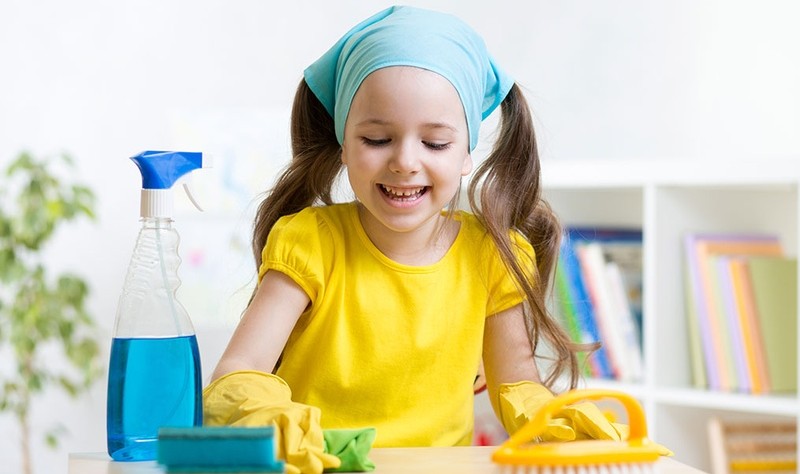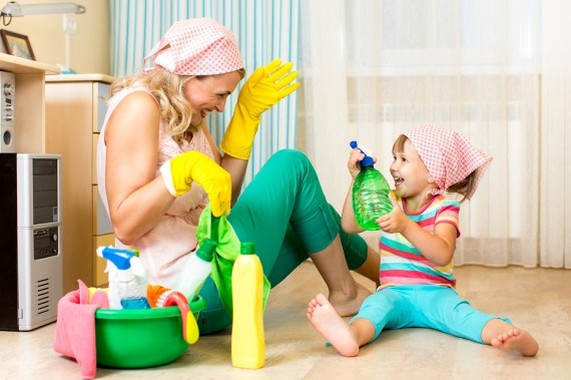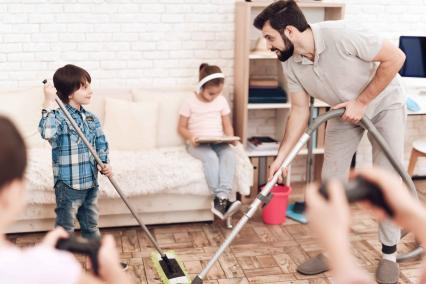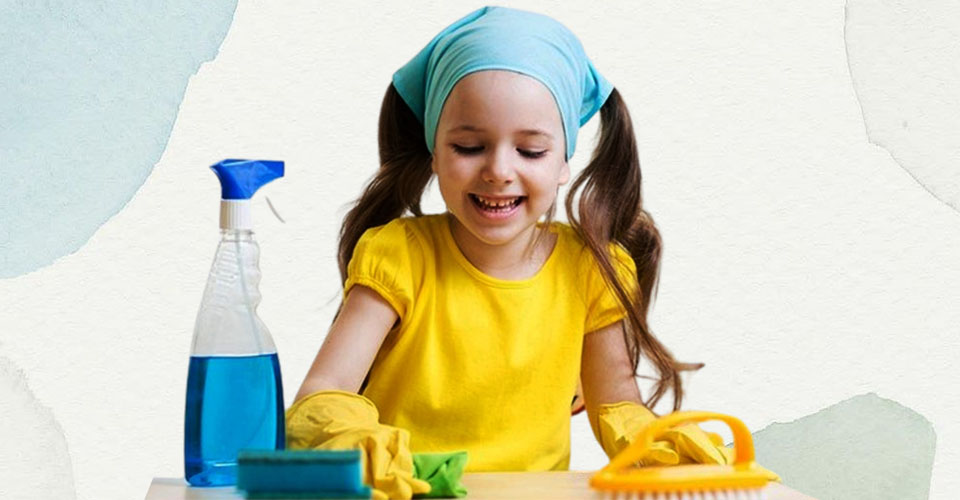Many parents struggle every day with getting kids to clean up. The battle against untidiness often feels like walking uphill, from toys spread all over the living room to clothes littering bedrooms.
However, it’s not just about keeping a tidy home; getting kids to clean up and training children how to organize is a chance for them to learn some important skills and habits that will be of great help in their future.
In this article, we are going to show ten powerful tips for getting kids to clean up that can make cleaning fun and enjoyable for both children and the entire family.
10 Effective Ways For Getting Kids To Clean Up
1. Make It A Game To Get Kids To Clean Up
When cleaning becomes a chore, getting kids to clean up by turning it into a game can make it fun. Set a timer and challenge your child to see how many toys they can pick up before the time runs out.

You may add more excitement to that by having them compete against their prior record or asking them to clean faster than their brother or sister.
Another suggestion to get kids to clean up is to turn this into a scavenger hunt where children have to locate and put away different items with the use of clues or hints. This creates an interactive cleaning process as well as engaging one’s ability to solve problems.
2. Set a Good Example
Children learn from what their mother and father do. Getting kids to clean up requires you to display positive attitudes towards cleaning and arranging will affect what your child does.
Ensure tidying up is part of your everyday schedule, start involving the kid in household tasks early on in life.
If they see you take pride in keeping things neat, they are likely to follow suit. For instance, tell them what you are doing while putting things in order such as “I am now clearing the table” so that they understand the procedures involved while learning about the importance of cleanliness.
3. Use Music
Music has an enormous impact on mood as well as motivation, therefore being useful in getting kids to clean up and making cleaning more enjoyable.
Develop a playlist for cleanup made-up songs chosen by your children or using fast-tempo music. Put on some dancing music that could keep them busy at home when you are trying to get kids to clean up.
You might also turn it into some kind of disco—every time one song ends, he/she moves on to another task or area for cleaning purposes. Music not only makes this more interesting but also helps set the pace and invigorate them through their work
4. Establish a System of Rewards.
Reward systems can be implemented to make clean behaviors more likely to occur. Choose a plan that suits your family, like earning points, stickers, or tokens as kids complete tasks.
For example, you may set milestones which include cleaning their room or doing chores without reminding them and then rewarding accordingly. After accumulating the required number of points they can exchange them for little treats, bonus screen time, or any privilege they want.
This system of getting kids to clean up helps enforce good habits and makes cleaning become more rewarding for children who have something to aim at.
Read More: Wake Up Kids for School with These 7 Morning Magic Tricks!
5. Specify what you want
Getting kids to clean up requires clear communication. Give them simple instructions that they will easily grasp. Rather than just telling your child “clean your room,” break it down into smaller parts: “Firstly, put your clothes in the hamper.

Lastly, put away all your toys.” With this approach, one eliminates overwhelm and gives the child an easy path to follow. Indicate where items belong and constantly remind them of this fact so that a routine can be established.
6. Picture Objects
Visual representations help especially with young children or those who learn visually better than others do. Make lists that have pictures illustrating what should be cleaned up and how items should be arranged within a space.
Tasks such as storing books back on shelves, arranging toys properly on the floor, or folding clothing can be represented by drawings or photographs.
Put these visuals in places accessible to the children such as close to the toy storage area or behind their bedroom door so they can use it themselves when needed.
This visual reinforcement highlights the steps involved while enabling children to take charge by keeping their environment tidy on their initiative.
7. Dismantle Tasks into Smaller Units
Getting kids to clean up by giving them large cleaning tasks can make them feel overwhelmed and eventually lead to postponements or irritations. Break down jobs into smaller action steps that are approachable.
For instance, instead of asking them “Clean your room” you may tell them what to do step by step like this; “Firstly, collect all the wears on the floor. Then put back the books in their shelves”.
This way of getting kids to clean up not only makes the task more possible, but it also instructs children on how to prioritize and approach tasks systematically.
The progress they will be making will be appreciated as they go on so that their motivation is kept alive and efforts made stronger.
Read More: How To Divide Chores Among Kids: 10 Effective Tips For Parents!
8. Give Choices
Offer your child alternative ways of getting kids to clean up thus making him/her feel empowered during the process. Is it better for them to start with desk wash or bookshelf arrangement?
Enhancing a sense of control over their surroundings can encourage children’s involvement in cleaning up exercises.
Besides, let them decide how their belongings should be arranged such as which boxes should be used for keeping toys or where they would prefer to put their drawings;
This collaborative method of doing things gives children a feeling of owning and taking care of their environment.
9. Employ Positive Reinforcements
Positive reinforcements remain an influential tool to get kids to clean up that can be used to steer children’s behavior towards desired behaviors like getting kids to clean up.
Even if the outcome is not perfect, commend your child for their work and achievements.

Appreciate their initiative and perseverance like “You did such a good job putting your toys back” or “Thank you for arranging your books.” This positive reinforcement makes them desire to do something more of it in the future because they know you will be appreciative.
Try praising them with words, giving high fives or making comments about how good they are at doing certain tasks connected with cleanliness.
10. They Should Be Part of It
To foster ownership and responsibility, encourage your child to actively participate in organizing and managing their own space. You can help them decide how best to arrange their rooms or play areas.
Ask them where things should go and how they would like to have them displayed. If children feel that they are part of what surrounds them, they shall do everything possible to make sure that it remains clean.
Teach organizational skills by using this time and also cultivate pride in keeping a neat space.
Read More: Teaching Kids Gratitude: 10 Beneficial Tips For Parents!
A Word From Mind Family
Getting kids to clean up can sometimes feel like a daunting task, but with creativity and consistency, it can become a positive experience for the whole family.
By turning cleaning into a game, setting a good example, and using tools like music and visual aids, you can make tidying up fun and engaging.
Rewarding their efforts, setting clear expectations, and offering choices empower children to take ownership of their space.
Positive reinforcement and involving them in the process not only teach valuable life skills but also foster a sense of responsibility and pride. Together, these strategies to get kids to clean up create a foundation for lifelong habits of cleanliness and organization.
Frequently Asked Questions (FAQs)
1. How can I make cleaning fun for my child?
Use games, music, and challenges like scavenger hunts to engage them in cleaning activities.
2. What role does parental example play in teaching cleanliness?
Parents who model tidy habits and involve children in chores set positive examples for cleanliness.
3. How can music help to get kids to clean up?
Music boosts mood and motivation, turning cleaning into a lively and enjoyable activity.














Leave a Reply